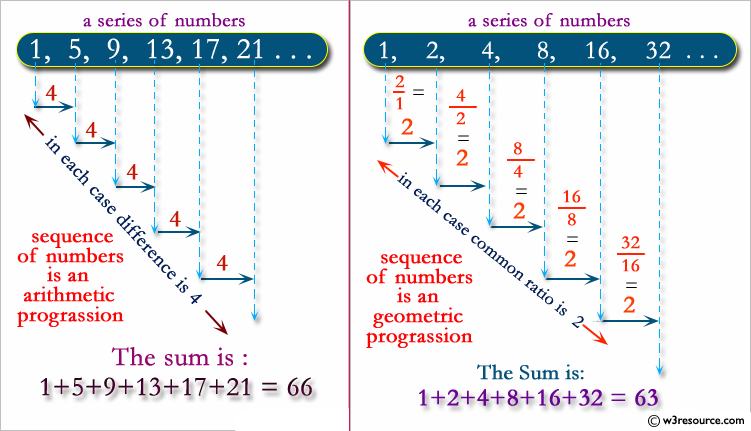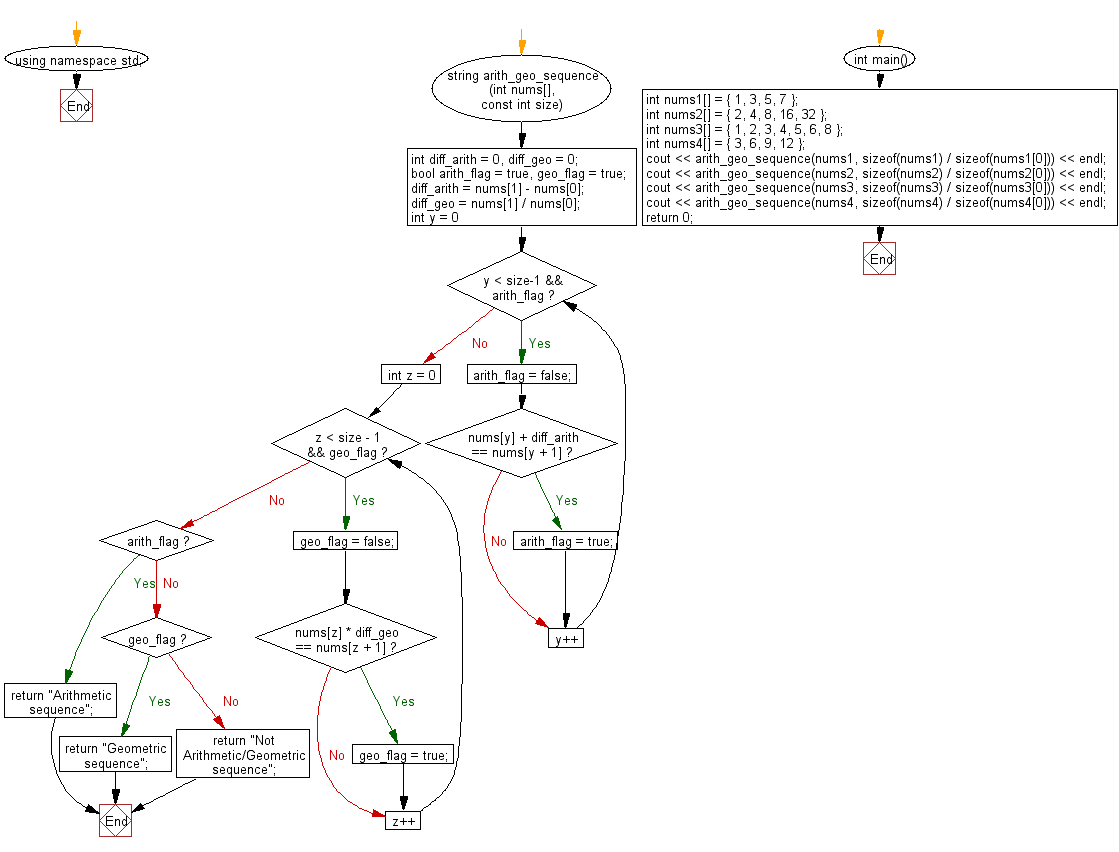C++ Exercises: Check whether the sequence of the numbers in a given array is a “Arithmetic” or “Geometric” sequence
C++ Basic: Exercise-84 with Solution
Write a C++ program to check whether the sequence of the numbers in a given array is a “Arithmetic” or “Geometric” sequence. Return -1 if the sequenc is not “Arithmetic” or “Geometric”.
From Wikipedia
In mathematics, an arithmetic progression (AP) or arithmetic sequence is a sequence of numbers such that the difference between the consecutive terms is constant. Difference here means the second minus the first. For instance, the sequence 5, 7, 9, 11, 13, 15, . . . is an arithmetic progression with common difference of 2.
In mathematics, a geometric progression, also known as a geometric sequence, is a sequence of numbers where each term after the first is found by multiplying the previous one by a fixed, non-zero number called the common ratio. For example, the sequence 2, 6, 18, 54, ... is a geometric progression with common ratio 3. Similarly 10, 5, 2.5, 1.25, ... is a geometric sequence with common ratio 1/2.
Pictorial Presentation:

Sample Solution:
C++ Code :
#include <iostream>
#include <string>
using namespace std;
string arith_geo_sequence(int nums[], const int size) {
int diff_arith = 0, diff_geo = 0;
bool arith_flag = true, geo_flag = true;
diff_arith = nums[1] - nums[0];
diff_geo = nums[1] / nums[0];
for (int y = 0; y < size-1 && arith_flag; y++)
{
arith_flag = false;
if (nums[y] + diff_arith == nums[y + 1])
{
arith_flag = true;
}
}
for (int z = 0; z < size - 1 && geo_flag; z++)
{
geo_flag = false;
if (nums[z] * diff_geo == nums[z + 1])
{
geo_flag = true;
}
}
if (arith_flag)
{
return "Arithmetic sequence";
}
else if (geo_flag)
{
return "Geometric sequence";
}
else
{
return "Not Arithmetic/Geometric sequence";
}
}
int main() {
int nums1[] = { 1, 3, 5, 7 };
int nums2[] = { 2, 4, 8, 16, 32 };
int nums3[] = { 1, 2, 3, 4, 5, 6, 8 };
int nums4[] = { 3, 6, 9, 12 };
cout << arith_geo_sequence(nums1, sizeof(nums1) / sizeof(nums1[0])) << endl;
cout << arith_geo_sequence(nums2, sizeof(nums2) / sizeof(nums2[0])) << endl;
cout << arith_geo_sequence(nums3, sizeof(nums3) / sizeof(nums3[0])) << endl;
cout << arith_geo_sequence(nums4, sizeof(nums4) / sizeof(nums4[0])) << endl;
return 0;
}
Sample Output:
Arithmetic sequence Geometric sequence Not Arithmetic/Geometric sequence Arithmetic sequence
Flowchart:

C++ Code Editor:
Contribute your code and comments through Disqus.
Previous: Write a C++ program which reads a list of pairs of a word and a page number, and prints the word and a list of the corresponding page numbers.
Next: Write a C++ program find the total number of minutes between two given times.
What is the difficulty level of this exercise?
